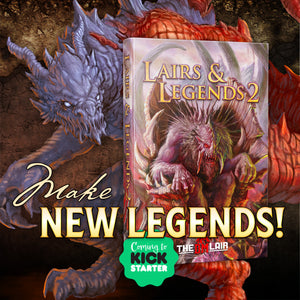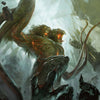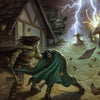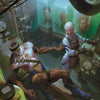7 Things Players Love and Wish Their DMs Would Do More
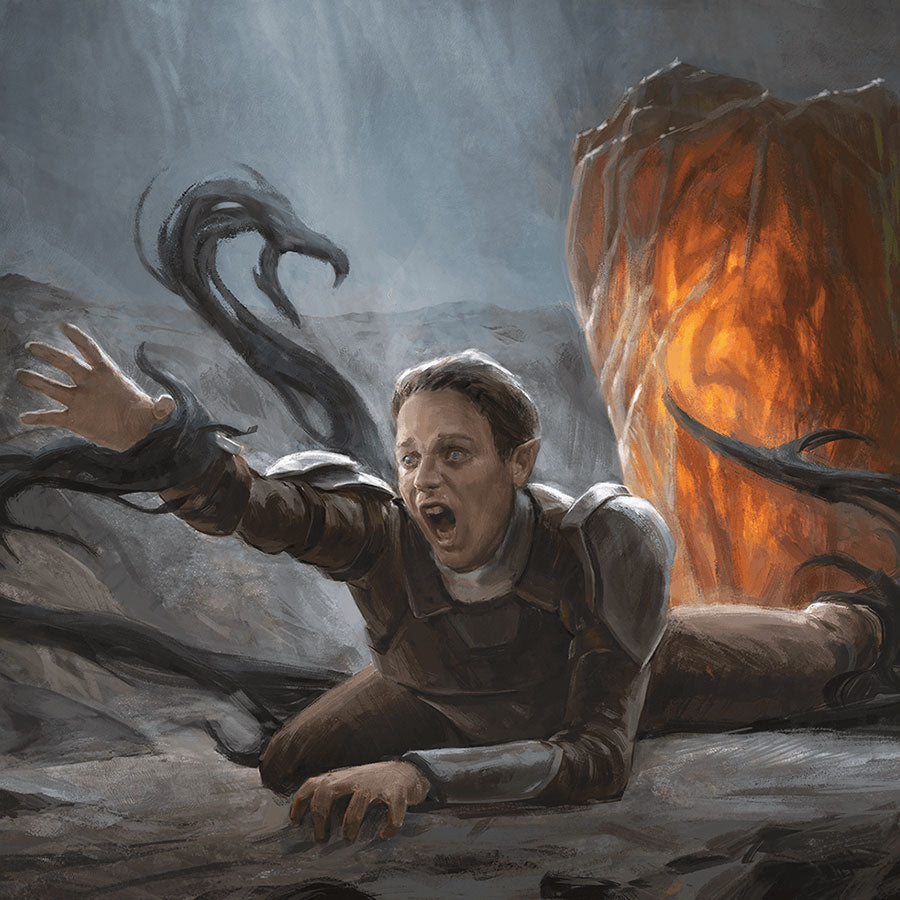
Written by Luke Hart
In my Sword Coast Guard Campaign, my players were faced with a diabolical choice: confront the ancient white dragon before it took wing to destroy the town of Leilon OR stop the frost giant army before it sacked Rassalantar. BUT they could not do both. It was ONE OR THE OTHER.
Ultimately, they chose to take out the dragon, reasoning that it was more dangerous since it could fly quickly from town to town, whereas the frost giant army marched along much slower, so while still dangerous, the damage they could do was more contained. And, of course, it was a dragon in its lair, so LOOT! Yeah…a mix of logic and greed, I suppose.
And then, after they took out the dragon, when they finally caught up with the frost giants, you better believe they also found Rassalantar lying in pile of smoking ruins. For every good moral quandary MUST come with consequences, otherwise it’s not a quandary, is it?
Hi, I’m Luke Hart, and on this site, I share my nearly 30 years of game master experience so that you can run amazing games that your players will love. And today we’re talking about seven things dungeon masters often neglect but that players love.
By the way, if you’re a busy GM without enough to time to prep like you know you should, Lairs & Legends can help. Grab an adventure, read it in about 15 minutes, and you’re ready to run your game! There’s no reason to feel stressed out and overwhelmed before your next D&D game.
Watch or listen to this article by clicking the video below.
#1 Moral Dilemmas
This is what my players confronted in my previous example. Pick A or B, and either way you’re screwed. You can help someone, but another suffers. This is something that every good villain does: get in the head of the heroes, and let’s face it, you’re the villain. So, make your players sweat it out. Make their consciences sting a little. They may be able to save the world, but villages will burn in the process. It may SEEM like players want everything to resolve to a perfect ending; everything should be a win; but the truth is that the most satisfying victories come when there was a great price to be paid.
#2 Narrative Descriptions
Many game masters are decent enough at describing SCENES—rooms, castles, a lonely stretch of road in the forest—but they often COMPLETELY NEGLECT describing other things in the game such as combat or the mannerisms of an NPC as they talk with the group. “The hissing insectoid rears up, opens its mouth, and spews out a stream of liquid that sissles and burns as it splatters on everything in the room, including you.” Is way better than “The ankhed spits acid at you.” “The innkeeper frequently picks at his nose while he tells you about the bandits along the roadway and serves drinks.” Is way better than “The innkeeper tells you about the bandits.” If something is happening in the game, it’s probably worthy of a narrative description—add spice, add details! Just remember: short and sweet. One sentence, paint a picture, and then MOVE ON.
#3 Be Generous with Information
Remember, YOU KNOW EVERYTHING. Or at least you should… You designed the adventure or read the module. However, your players don’t. If they seem lost or unsure or seem not to remember a piece of key information that you already gave them: FILL IN THE BLANKS. Remind them. Give them more information. Help them along. Unless you’re running a mystery where the point is for players to grope around a bit, wandering around blindly in the dark and just hoping you go where you’re supposed to or do the “right thing” is rarely very satisfying for players. Provide sufficient clues; lay breadcrumbs; accept the “wrong” answer if it still makes sense in order to move things along. And if your players are wandering in circles, step in and guide them back to the right track. Subtly if at all possible, of course.
#4 Use Special Voices
I’m going to harp on this until I run out of breath. I don’t care if you THINK you suck at special voices or “accents.” I don’t care if it makes you feel self-conscious. Get over yourself. THIS. WILL. MAKE. YOUR. GAME. BETTER. Almost every single game I’ve been in that has been AMAZING has been one where at least the game master and a few players used special voices when they were talking in character. This elevates the game experience; there’s no way around it. I’m not a voice actor; you’re probably not either. WHO CARES. The game will be better. And if you do it first, others will feel more comfortable doing it, too.
#5 Manage the Game
Group activities do not manage themselves. It takes a leader. And whether you think of yourself as a leader or not, as the game master, YOU ARE the leader of the group. And when I say manage the game, this is what I mean. First, get the game started. As a player, I hate it when the game supposedly starts at 1 pm, and I’m there kind of on time, but the game doesn’t start until 1:30 or 2:00 because the GM is just allowing folks to chat instead of getting things rolling. Now, I don’t have a problem with a little chit-chat, because a lot of us are friends and we want to catch up a bit—and that unrelated chit-chat does lead to better relationships and better games—but it needs to be kept to a reasonable limit.
I was once in a game that was complete chaos. Players were talking constantly, often over top of each other; the game master had his head buried in the module looking stuff up; players were declaring actions; the game master literally had a queue of five actions to resolve; once he resolved one of them; two more joined the queue; he forgot half of the actions that had been declared; players were getting bored and moving into adjacent rooms to spice things up—IT WAS LITERAL PANDEMONIUM. I didn’t stay in that game for very long. As a game master, you need to keep the chaos to a dull simmer. Resolve one action before allowing other players to declare their actions—and when they jump the gun, gently remind them that you need to resolve the other player’s action first. Finally, be prepared so that you can RUN THE GAME instead of look crap up in books.
Oh, and maintain the gaming schedule. Be adamant. We play every two weeks on Sunday at 4 pm. If you can’t make it, that’s okay; just let me know, but we’re still playing. We don’t cancel or reschedule unless at least three players can’t make a game. Frequent cancellations and rescheduling is the spiral of death, and your campaign won’t survive it for long.
#6 Make Travel Interesting…or Skip It
Recently, my Thieves Abound players came across tons of footprints as they were traveling from Khor Badhir back to Frostmantle. Clearly an army had come through, but my players were free to investigate or skip it. They investigated, found an undead army of perhaps a thousand zombies marching on a small dwarven mining outpost, and decided to do something about it. Yes, the trail of zombies on the march is a point of interest in my book. In a different game, my players discovered an ancient tower that disappeared every day at dawn and reappeared in a different part of the world. And they nearly decided to see where it goes, which would have changed the course of the entire campaign!
My point is this: if you can’t do something more interesting than a random encounter with a battle battle and a fight fight and a smacky smacky, maybe your players should just arrive from point A to point B without anything at all happening. Now, I got no problem with an occasional random fight because you found some super cool monster in the book. However, when players do travel, I’d use about 80% points of interest and only 20% random encounters—which, in my book are almost always PLANNED ENCOUNTERS that I usually try to tie to the main plot anyway.
#7 Run Challenging Combats
You may THINK your players just want to be super heroes and curb stomp everything, but you’re wrong. Even if your players TELL YOU that’s what they want, they’re wrong. Look, stupid easy combats get old and boring after a while. A nasty surprise waiting around the corner that forces your players to FIGHT FOR THEIR LIVES and JUST BARELY win, will leave them exhilarated and riding an adrenaline high. Trust me, I’ve seen this at my tables. Players are happiest and most jubilant just after they survive a tough battle, even if there were a few character deaths. The best games in my experience are those that include a mix of easy and medium difficulty combats, and then every so often have one that’s completely BRUTAL.
Get Loads of 5e Adventures and Resources for Your Games!
As a new dungeon master, I was overwhelmed with everything I needed to do. Learn the rules, create the adventures, run the game, handle problem players—it was A LOT! And even as a veteran DM, it’s still a lot. You might even feel that way yourself.
If you’re looking for loads of 5e adventures that you can prep in under 30 minutes or elements such as traps, puzzles, and encounters that you can drag and drop into your game at a moment’s notice, we have you covered!
With Lairs & Legends and Loot & Lore, you’ll get over 700 pages of 5e resources:
- Twenty-nine 5e adventures spanning levels 1 to 15 and designed for groups of 4 to 6 players.
- Over 100 new creatures from CR 0 to CR 24.
- Adventure Ideas
- Encounters with Full-Color and Blackline Digital Maps
- Patrons & Factions
- Magic Items
- NPCs
- Puzzles
- Random Encounter Tables
- Random Tables
- Spells
- Subclasses
- Traps
- Villains
Everything is designed to be EASY TO USE and QUICK TO PREP for your game. Our goal is to make game masters’ lives easier, not more complex!
Don’t spend another moment frustrated and overwhelmed as a GM. Pick up the Lairs & Legends Ultimate Bundle today and find out how much easier being a GM can be!
-
Posted in
Game Master How-To Articles


